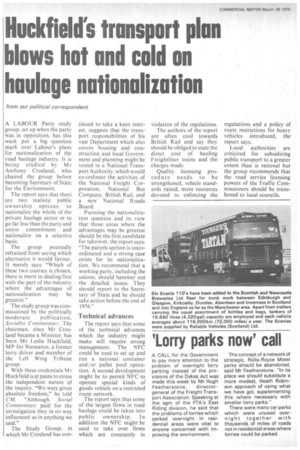Huckfield's transport plan blows hot and cold on haulage nationalization
Page 14

If you've noticed an error in this article please click here to report it so we can fix it.
from our political correspondent
A LABOUR Party study group, set up when the party was in opposition. has this week put a big question mark over Labour's plans for nationalization of the road haulage industry. It is being studied by Mr Anthony Crosland. who chaired the group before becoming Secretary of State for the Environment.
The report says that there are two realistic public ownership options: to nationalize the whole of the private haulage sector or to go far less than the party and Union commitment and nationalize on a selective basis.
The group pointedly refrained from saying which alternative it would favour.
It merely says: "Which of these two courses is chosen, there is merit in dealing first with the part of the industry where the advantages of nationalization may be greatest."
The study group was commissioned by the politically moderate . publication.
SociaIci Commentarr. The chairman, since Mr Cros
land became a Minister, has
been Mr Leslie Huckfield, MP for Nuneaton, a former
lorry driver and member of the Left Wing Tribune group.
With these credentials Mr H uckfield is at pains to stress the independent nature of the inquiry. "We were given absolute freedom," he told
CM. "Although Social Commentary paid for the investigation they in no way influenced us in anything we said."
The Study Group, in which Mr Crosland has con tinned to take a keen interest, suggests that the transport responsibilities of his vast Department which also covers housing and construction and local Government and planning might be vested in a National Transport Authority, which would co-ordinate the activities of the National Freight Corporation, National Bus Company, British Rail, and a new National Roads Board.
Pursuing the nationalization question and its view that those areas where the advantages may be greatest should be the first candidate for takeover, the report says: "The parcels section is uncoordinated and a strong case exists for its nationalization. We recommend that a working party, including the unions, should hammer out the detailed issues. They should report to the Secretary of State and he should take action before the end of 1976."
Technical advances
The report says that some of the technical advances which the industry might make will require strong management. The NFC could be used to set up and run a national container and/ or pallet pool operation. A second development might be to permit NFC to operate special kinds of goods vehicle on a restricted route network.
The report says that some of the largest firms in road haulage could be taken into public ownership. In addition the NFC might be used to take over firms which are constantly in
violation of the regulations.
The authors of the report are often cool towards British Rail and say they should be obliged to state the direct cost of hauling Freightliner trains and the charges made.
Quality licensing procedure needs to be strengthened, vehicle standards raised, more resources devoted to enforcing the regulations and a policy of route restrictions for heavy vehicles introduced, the report says.
Local authorities are criticized for subsidizing public transport to a greater extent than is rational but the group recommends that the road service licensing powers of the Traffic Commissioners should be transferred to local councils.




























































































